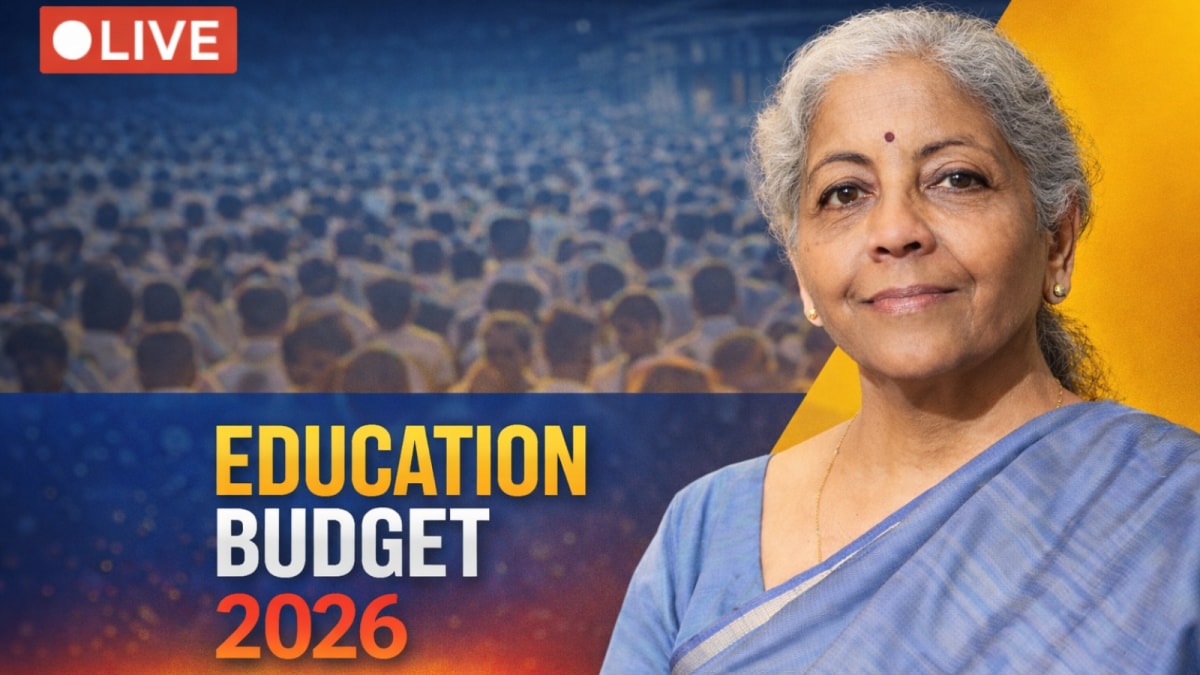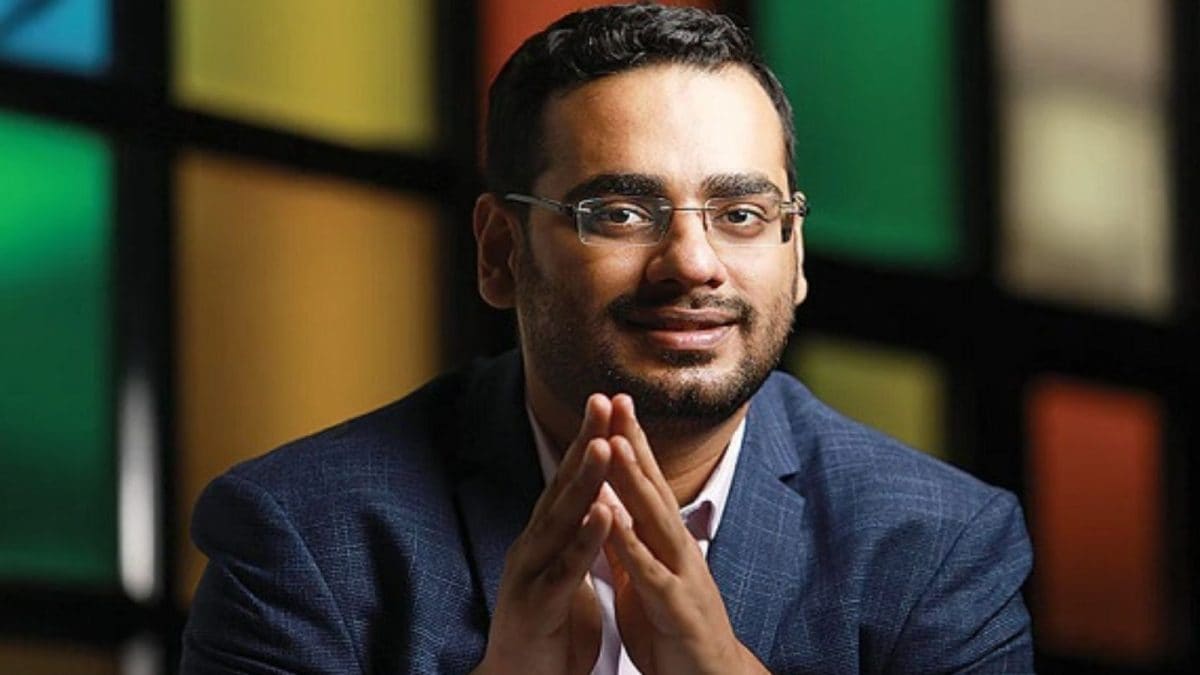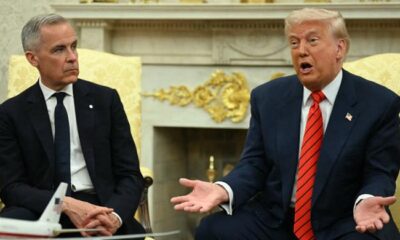Business
Financial CEOs are weighing in on the state of the economy

Some of America’s top financial services executives are starting to issue warnings about the economy.
Saying they’re seeing signs of “softening” or “weakening,” a slew of CEOs have been weighing in ahead of next week’s Federal Reserve decision and with the U.S. Bureau of Labor Statistics revising job numbers lower this week.
In a Wednesday CNBC interview, Goldman Sachs CEO David Solomon said while the economy is “still chugging along,” the signals may be pointing in a different direction.
“There are number of CEOs that are talking about a softening in the economy – there’s no question,” he said. “We’ve seen some job data that indicates that there has been some softening.”
The BLS, in a preliminary report released Tuesday, revised its nonfarm payrolls data for the year prior to March 2025, showing a significant drop of 911,000 from the initial estimates. The revisions were more than 50% higher than last year’s and the biggest shift in more than 20 years, adding to growing concern over the economy.
The BLS has also come under fire from President Donald Trump, who fired the head of the bureau in early August and has criticized its data collection methods.
Solomon said he believes there’s “still more work to do” with today’s inflation and that tariffs are having an impact on growth, but that it’s difficult to quantify at this stage. As the economy heads into fall, Solomon said he expects a slight change in the policy rate, including a 25-basis point cut by the Fed next week.
Trump has also been critical of the central bank, calling for lower interest rates and bashing Fed Chair Jerome Powell. The Federal Open Market Committee last cut its benchmark interest rate in December 2024 and has held it steady since then in a target range of 4.25% to 4.5%.
JPMorgan Chase CEO Jamie Dimon told CNBC on Tuesday that he believes the Fed will “probably” lower interest rates at its meeting next week, but that it may “not be consequential to the economy.
Dimon said he also believes the BLS report confirms that the U.S. economy is slowing down.
“I think the economy is weakening,” Dimon told CNBC’s Leslie Picker in an interview. “Whether it’s on the way to recession or just weakening, I don’t know.”
But ultimately, Dimon said the country will simply have to “wait and see” how the economy will progress given the weakening consumer.
Similarly, Wells Fargo CEO Charles Scharf told CNBC Wednesday that his bank is seeing lower-income Americans struggling to stay afloat, despite larger companies seemingly doing well.
“There is this big dichotomy between higher-income and lower-income consumers which continues and is a real issue,” Scharf said.
Commenting on the BLS numbers, Scharf said it’s “undeniable” that the discrepancy between American taxpayers exists and that he sees “more downside” to the U.S. economy.
Job creation in August also showed signs of weakness, as the BLS reported last week that nonfarm payrolls increased by just 22,000 for the month.
Morgan Stanley CEO Ted Pick told CNBC that he believes the American CEO or CFO has had to become resilient throughout the country’s recent ups and downs, including Covid and two Trump administrations.
“We’re in a place where I think some of the policy uncertainty is actually starting to get quantified,” he said.
Still, Pick said he’s seen the headwinds coming through and believes the policy uncertainty may be narrowing slightly.
“So, yes, there may be a little bit of a slowdown,” Pick said, adding that he’ll wait to see how it all plays out.
Barclays CEO C. S. Venkatakrishnan said on CNBC on Tuesday that he believes the Fed will cut on the margin, partly due to the softness in the labor market.
Traders are also expecting to see the Fed lower rates. They currently see a near certainty that the Fed will cut by at least a quarter point, according to the CME Fedwatch tool based on Fed futures trading, and some are betting that there will be an even deeper cut of 50 basis points, or a half percentage point.
Even if inflation problems haven’t tangibly presented themselves yet, Venkatakrishnan said the current economy is signaling that CEOs should have their eyes on the longer term.
“We haven’t seen them yet, but we’ve got to be worried about them,” he said.
PNC Financial Services CEO Bill Demchak also joined the wave, telling CNBC on Tuesday there’s “underlying pressures in our economy” between hiring workers, labor shortages, wage pressure and more.
Demchak said he’s seeing evidence to support the BLS’ revised report, and he believes that evidence is likely the reason that the Fed will cut rates going forward, even as consumer spending is “driving the economy.”
“There’s pressures inside of our economy that I don’t know disappear just because tariffs might get behind us at some point,” Demchak said.
Business
Budget 2026: Cabinet gives green signal to Union Budget 2026–27

New Delhi: The Cabinet on Sunday approved the Union Budget 2026-27 during a meeting in Parliament chaired by Prime Minister Narendra Modi. A meeting of the Union Cabinet was held at Sansad Bhawan at 10 a.m., and after the Cabinet’s approval, Finance Minister Nirmala Sitharaman proceeded to Parliament to present the Budget.
Earlier, FM Sitharaman met President Droupadi Murmu and offered her a copy of the digital budget. The President also offered ‘dahi-cheeni’ (curd and sugar) to Sitharaman when she arrived at the Rashtrapati Bhavan. The Finance Minister was seen carrying her trademark ‘bahi-khata’, a tablet wrapped in a red-coloured cloth bearing a golden-coloured national emblem on it.
Minister of State for Finance Pankaj Chaudhary, Chief Economic Advisor Dr V. Anantha Nageswaran, Central Board of Direct Taxes (CBDT) Chairman Ravi Agrawal and other officials were seen accompanying the Finance Minister. Sitharaman was set to present her ninth consecutive Union Budget in the Lok Sabha. In 2021, she switched to using a digital tablet to carry the Budget papers, further promoting a modern and eco-friendly approach.
The ‘bahi-khata’ is a red pouch that holds the digital tablet containing the Budget documents. This year, Sitharaman opted for a deep maroon Kanjeevaram saree from Tamil Nadu. The saree featured a deep maroon base with a contrasting border and subtle gold detailing, paired with a yellow blouse.
The Budget is likely to strike a deft balance of sustaining growth momentum and maintaining fiscal consolidation. It also needs to address near-term challenges emanating from unprecedented geopolitical flux, said economists. According to economists, the budget is likely to focus more on capital expenditure, especially in sectors deemed to be strategically important owing to prevailing geopolitical compulsions.
While the FY26 Budget was more tilted towards stimulating middle-class consumption with tax reliefs, the FY27 Budget’s approach to stimulating consumption will be selective, they added.
Business
Education Budget 2026 Live Updates: What Will The Education Sector Get From FM Nirmala Sitharaman?

Union Education Budget 2026 Live Updates: Union Finance Minister Nirmala Sitharaman will present the Union Budget 2026–27 on February 1, with a strong focus expected on the Education Budget 2026, a key area of interest for students, teachers, and institutions across the country.
In the previous budget, the Bharatiya Janata Party government announced plans to add 75,000 medical seats over five years and strengthen infrastructure at IITs established after 2014. For 2025, the Centre had earmarked Rs 1,28,650.05 crore for education, a 6.65 percent rise compared to the previous year.
Meanwhile, the Economic Survey 2025–26, tabled in the Parliament of India, points to persistent challenges in school education. While enrolment at the school level is close to universal, this has not translated into consistent learning outcomes, especially beyond elementary classes. The net enrolment rate drops sharply at the secondary level, standing at just over 52 per cent.
The survey also flags concerns over student retention after Class 8, particularly in rural areas. It notes an uneven spread of schools, with a majority offering only foundational and preparatory education, while far fewer institutions provide secondary-level schooling. This gap, the survey suggests, is a key reason behind low enrolment in higher classes.
Stay tuned to this LIVE blog for all the latest updates on the Education Budget 2026 LIVE.
Business
LPG Rates Increased After OGRA Decision – SUCH TV

The Oil and Gas Regulatory Authority (Ogra) has increased the price of liquefied petroleum gas (LPG). According to a notification, the price of LPG has risen by Rs6.37 per kilogram. Following the increase, the price of a domestic LPG cylinder has gone up by Rs75.21. The revised prices have come into effect immediately.
The rise in LPG prices has added to the inflationary burden on household consumers.
-

 Business1 week ago
Business1 week agoSuccess Story: This IITian Failed 17 Times Before Building A ₹40,000 Crore Giant
-

 Fashion1 week ago
Fashion1 week agoSouth Korea tilts sourcing towards China as apparel imports shift
-

 Sports1 week ago
Sports1 week agoTransfer rumors, news: Saudi league eyes Salah, Vinícius Jr. plus 50 more
-

 Sports5 days ago
Sports5 days agoPSL 11: Local players’ category renewals unveiled ahead of auction
-

 Politics1 week ago
Politics1 week agoTrump revokes Canada’s invitation to join Board of Peace
-

 Fashion1 week ago
Fashion1 week agoTamil Nadu wind policy tweaks to boost textile sector competitiveness
-

 Entertainment1 week ago
Entertainment1 week agoThree dead after suicide blast targets peace committee leader’s home in DI Khan
-

 Sports1 week ago
Sports1 week agoWanted Olympian-turned-fugitive Ryan Wedding in custody, sources say












